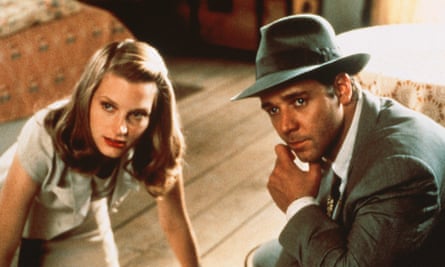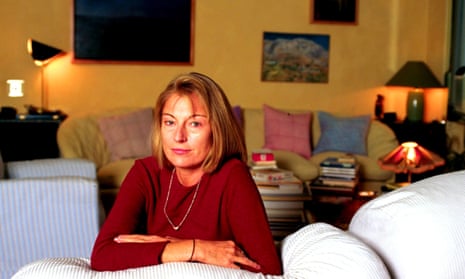When the film director Michelangelo Antonioni visited the London party circuit in the mid-1960s in preparation for his thriller Blow-Up, he met a woman named Cloe Peploe; she informed him that the person he should really speak to was her sister, Clare, who was obsessed with his work.
The film-maker called one afternoon at their house in Chapel Street, Belgravia, something of a bohemian hub. Actors were known to drop by after evening performances. Several lodgers lived there with the sisters and their brother, Mark, though no one seemed to know their names.
Waiting alone in the living room, Antonioni was startled to see a snake slithering across the floor toward him, having escaped from its tank upstairs. Just as the great auteur was wondering whether to hotfoot it out of there, Clare Peploe appeared. They hit it off immediately and were in a relationship for seven years, through the shooting of Blow-Up (1966) and into the director’s next picture, the politically charged countercultural hit Zabriskie Point (1970).
She was one of five credited writers on that film (the playwright Sam Shepard was another) but her contribution extended beyond the page: she also introduced Antonioni to the music of Pink Floyd, which became a vital part of the soundtrack.

Peploe, who has died aged 78 of lung cancer, eventually became a film-maker in her own right. She brought a breezy touch to complicated relationships in a handful of comedy-dramas. Her short film Couples and Robbers (1981), starring Rik Mayall and Frances Low as newlyweds who turn car thieves after a disappointing wedding ceremony, was nominated for an Oscar.
Her feature debut High Season (1988), co-written with her brother, brought together a photographer (Jacqueline Bisset), her ex-husband, a sculptor (James Fox), a traditionalist matriarch (Irene Papas) and an art expert-cum-Russian spy (Sebastian Shaw) on the Greek island of Rhodes for a gentle clash of history and tourism. Roger Ebert called it “an example of a rare species: the intelligent silly movie”.
The director was at her dottiest in Rough Magic (1995), a mix of film noir pastiche, Saturday morning serial and magic realism. The unlikely dramatis personae included a gumshoe (Russell Crowe), a quack doctor (Jim Broadbent) and a conjuror’s assistant (Bridget Fonda) who turns an adversary into a sausage.
Peploe’s most impressive work was her screenplay for Besieged (1998), in which a reclusive pianist (David Thewlis) becomes besotted with his Kenyan cleaner (Thandiwe Newton). The musician pledges to do anything for her, so she demands the one thing on which her happiness hinges: the freedom of her husband, who is a political prisoner. Short on dialogue but rich in warmth, humour and insight, it was directed masterfully by Bernardo Bertolucci, to whom Peploe was married from 1978 until his death in 2018.
They met shortly before he made Last Tango in Paris (1972), and bonded over a shared love of Jean-Luc Godard. Peploe was second assistant director on Bertolucci’s historical epic 1900 (1976) starring Robert De Niro and Gérard Depardieu, and co-wrote his film La Luna (1979), the tale of an opera singer (Jill Clayburgh) who has an incestuous affair with her heroin-addicted teenage son (Matthew Barry).
Peploe was born in Dar es Salaam, Tanzania. Her father, William (known as Willy), was a civil servant who later became an art dealer and director of the Lefevre Gallery in London. Her mother, Clotilde (nee Brewster), commonly known as Cloclo, was a painter. William’s work took the family immediately to Kenya, where they lived in the middle of a game reserve; Clare spent the first four years of her life there, and spoke Swahili. “It was bliss for a child,” she said in 1999. “I had no toys, but I don’t think I missed any toys – I had millipedes to play ball with.”
The family then moved to Florence and finally to London, where Clare spent most of her youth. She was educated at St Clare’s school, Oxford, and Westminster Tutors in London, and later studied French at the Sorbonne, and Italian at the University of Perugia.
Though she adored her husband’s work (“He puts breath into the tiniest, most insignificant moment,” she said in 1996), she usually banned Bertolucci from her productions for fear that his reputation would intimidate the cast and crew. Her own sets tended to be serene places.

“Clare was very intelligent and humorous but so, so quiet and soulful and restrained,” says the actor Peter Eyre, a friend since her Sorbonne days, who appeared in her short film as well as in La Luna. “When we made Couples and Robbers, I told her: ‘The crew can only just hear you say Action. And they never hear you say Cut.’ She would shoot a scene and then you’d just see everyone – the cameraman, the rest of the crew – looking around at each other.”
The last film she directed was The Triumph of Love (2001), which she adapted with Bertolucci from Marivaux’s 18th-century stage comedy. Jump-cuts, hand-held camerawork and a generally irreverent tone showed the couple’s Godard fixation to be very much still in evidence. The New York Times considered the play’s “jaunty, slightly decadent spirit” to be “well-served by the director and her superb cast”, which included Ben Kingsley, Fiona Shaw and Mira Sorvino.
Peploe is survived by Mark, the co-writer of Antonioni’s The Passenger (1975) as well as three films by Bertolucci including The Last Emperor (1987). Cloe died in 2009.

Comments (…)
Sign in or create your Guardian account to join the discussion